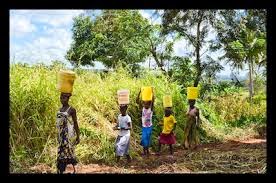 In September 2000, former President,
Chief Olusegun Obasanjo, joined other world leaders to attend the Millennium
Summit to map out some developmental goals that the country should achieve.
Many Nigerians heaved a sigh of relief thinking that the prayers of their
founding fathers were about to be answered. But little did they know that their
dream was still far from reality.
In September 2000, former President,
Chief Olusegun Obasanjo, joined other world leaders to attend the Millennium
Summit to map out some developmental goals that the country should achieve.
Many Nigerians heaved a sigh of relief thinking that the prayers of their
founding fathers were about to be answered. But little did they know that their
dream was still far from reality.
During the summit, eight goals were
set by the 189 United Nations member states at the time (there are about 193
currently), known as United Nations Millennium Declaration. These goals were
referred to as the Millennium Development Goals (MDG).
 The Millennium Development Goals
include: to eradicate extreme poverty and hunger; to achieve universal basic
education; to promote gender equality and empower women; to reduce child
mortality; to improve maternal health, to combat HIV/AIDS, malaria and other
diseases; to ensure environmental sustainability and to develop a global
partnership for development.
The Millennium Development Goals
include: to eradicate extreme poverty and hunger; to achieve universal basic
education; to promote gender equality and empower women; to reduce child
mortality; to improve maternal health, to combat HIV/AIDS, malaria and other
diseases; to ensure environmental sustainability and to develop a global
partnership for development.
It was, however, projected that by
2015, the member states must have achieved, if not all, a reasonable success
within the 15 years life span it has.
With all the supports given by
agencies such as the World Bank, International Monetary Fund, Agricultural
Development Bank and others, and with the current
state of Nigeria, one cannot be far from wrong if concluded that achieving the set goals seems impossible with barely a year to go and none of the goals has been satisfactorily achieved to the benefit of the common man.
 As of 2013, progress towards the
goals was reported to be uneven. Some countries achieved many goals while
others were not on track to achieve any. A.U.N conference which was held in
September, 2010, reviewed the progress and concluded with the adoption of a
global plan to achieve the eight goals by their target date. New commitments
targeted women and children’s health and new initiatives in the world wide
battle against poverty, hunger and disease were made.
As of 2013, progress towards the
goals was reported to be uneven. Some countries achieved many goals while
others were not on track to achieve any. A.U.N conference which was held in
September, 2010, reviewed the progress and concluded with the adoption of a
global plan to achieve the eight goals by their target date. New commitments
targeted women and children’s health and new initiatives in the world wide
battle against poverty, hunger and disease were made.
Nigeria who claims to be the giant
of Africa is undoubtedly behind some other African countries in their bid to
achieving the set goals.
Many Nigerians still live on less
than $1 per day. With this, how can it say that goal 1 has been achieved?
One will normally expect a country
like Nigeria, which is blessed with abundant human and natural resources not to
have any problems with achieving the goals. What is the use of the resources it
has if not to put it into use such that it will benefit the masses? In a
country where corruption is the order of the day, every other thing remains
either stagnant or regressing.
How much have we empowered women
when our girls who will become mothers of tomorrow had been kidnapped for about
three months and the President has not taken his time to visit Chibok in
order for him to show his sympathy to the affected? Can we say that an
environment that is riddled with terrorism is sustainable?
For Nigeria to achieve the MDG, it
needs selfless leaders. I mean leaders that will serve this country as if their
lives depend on the state of the nation, leaders that will distribute the
state’s resources equally between the elites and the masses. I believe Nigeria
is yet to have these types of leaders.
Nigeria is far from achieving any of
the goals. To others, the country might have achieved something. Assessing the
government’s effort is based on individual opinions.
MUBARAK IBRAHIM
Department of Animal Science,
Usma Danfodio University,
Sokoto, Nigeria


0 comments:
Post a Comment